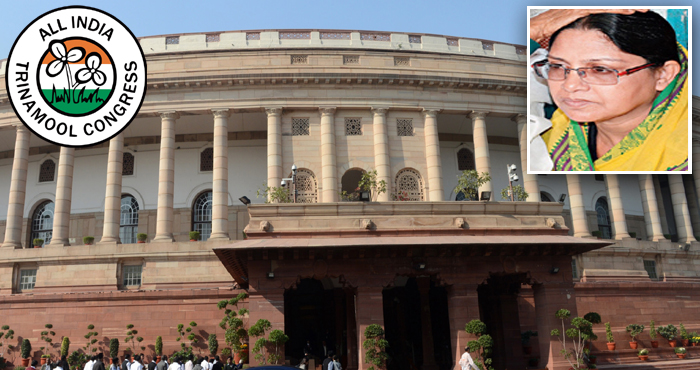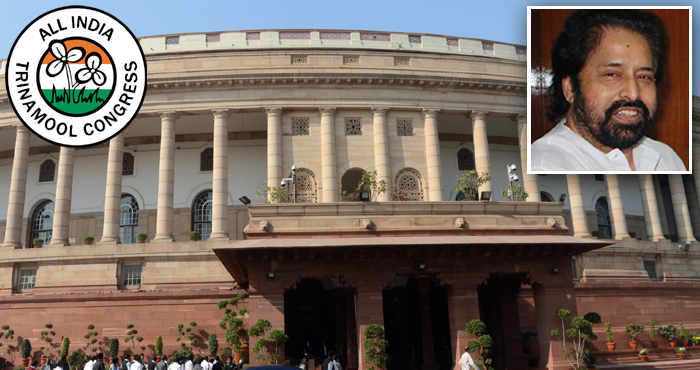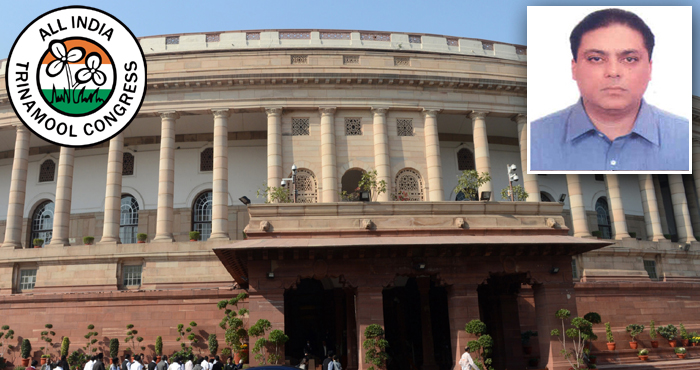Thank you Hon’ble Sir for giving me the opportunity to speak on this very important topic that is plaguing the world today. I stand here as a member of All India Trinamool Congress. We are actually standing at crossroads today whether to be a developing nation or not.
Certain nations have been developing at a faster pace than ours over the last centuries and they have also been major contributors towards the green gas emission. Their carbon footprint has also been much more than ours. When we take up the task of development, load of sanctions and interjections are being placed before us and we as a developing nation are facing this problem now.
So as my Hon’ble Chief Minister Smt Mamata Banerjee has rightly pointed out that with perspective to India the NGT has to be prudent in their restriction towards our development projects and refrain from overzealous actions.
I take this opportune moment to extend gratitude to the leaders of 193 countries who during the General Assembly Session of the United Nations in September, 2015 got together and took serious cognizance of this burning issue to strike a balance between growth and development of the nations and also to maintain nature environment to protect our planet.
Five things are involved in this total effort – people, planet, peace, prosperity and partnership between nations. The sustainable development goals were worked upon on the millennium development goals, eight of them were there, and we have done quite well.
And depending on that we have worked upon the SDGs which also involves the environment. MDGs did not take into cognizance the environmental factor but here we want to maintain the environment like all of us who are born from one mother, we have only one world. And to leave this world for our posterity we must protect the world.
Even if we are trying to develop in different fields we have to take care of our planet, of our nature, of our water bodies, and the SDGs have taken into consideration. This is the first time that all the nations first got together, discussed and then formulated the seventeen goals and 169 targets, that we are going to undertake over the next 14 years up to 2030 to meet our needs.
It is already coming to effect from first of January this year. And unlike many previous decisions the world together in consultation has drawn this up. It was not due to any regional decision, It was not due to any national decision, it was rather a quantitative decision dealing not only with human or the planet separately. Ecological sustainability was seen as an element of economic development.
The problems were taken to be universal and interconnected because the air quality getting disturbed over my country will go and affect another country. But in doing so we also have to take into consideration that we are growing, we are developing and we must be given more opportunity. The first six goals for MBG which were for poverty allegation, has been repeated here also. We the developing world need industrialization but we have to be protective towards mother earth.
On behalf of the people we serve we have adopted a historic decision on a comprehensive, far-reaching and people-centric set of universal and transformative goals. We are committed in achieving sustainable development in these three dimensions of economics social and environmental development to build upon the MDGs. But most important would be policy making.
When we are discussing it here today, budget allocation should be made towards meeting these 17 goals and 169 targets and we have to strike a balance. The developed world has been a major contributor towards polluting our water bodies, our air quality, depleting our forest, starting the practice of newer food techniques and we have followed suit and have forgotten our traditional foods.
Yesterday Hon’ble speaker had organized a meeting regarding SDGs, and there an honorable member was pointing out the present situation in which the current generation does not even recognize traditional foods like jawar and bajra for nutrition; we are dependent on packed foods. We are preparing them, packing and then marketing them; this involves artificial methods and energy consumption which is not good for the planet, we have to go back to our natural resources.
Six of the 17 goals here involves disaster risk reduction, recognizing the reduction of vulnerability of exposing the poor to diseases is important for sustainable poverty reduction. Out of the 17, the first one is poverty eradication. Poverty and environment are closely relates, especially when people depend for the primary source of livelihood on the environment.
Restoring natural systems and improving natural resource management practices at the grassroots level are essential to the strategy to eliminate poverty. Diversion of common and marginal lands to a more economically viable so to say useful purposes deprives the poor off a resource base which has traditionally met many of their sustenance needs, like the right of the forest should be with the people who live in the forest since ages are known. We should give them the power to live in the forest, to use the forest as their own to the adivasis and tribals who have been living there instead of cutting the trees and giving away the wealth of the forest, giving away the mines and minerals of the forests to multinationals.
Market factors also lead to the elimination of the crops that have traditionally been available to the diet of the poor. Here I would like to point out that these days baby food and prepared food is taking a serious toll on the health of the children. If the babies are breastfed, they are saved, they are protected from reproductory tract diseases, they are protected from diarrheal diseases. It is known that according to a very important study in the medical journal of Lancet breastfeeding can save 820000 lives annually preventing 13% of deaths of children under 5. Breastfeeding could reduce one third of the respiratory diseases, for India it could reduce 156000 child deaths each year. It would reduce maternal deaths of cancer, breastfeeding forms a natural contraceptive towards maintaining family size and it would also help prevent the lady from getting breast cancer or that of the reproductive tract; 4300 crores improved as far as the IQ of the child is concerned for a child who is breastfed. Not only that, the proprietary preparations that are marketed by different companies at the moment, they sell milk formulas at the moment which emit 111226 tonnes of greenhouse gasses. So many countries are encouraging mothers towards breastfeeding.
The United Nations is laying stress on infant and young children’s feed. There are reports that many children who have feed fed on formula milk remain stunted in growth, in chronic hunger and their IQ is not optimally developed. Not only that, due to greenhouse emissions during preparation, it generates carbon footprints. The industrially manufactured milk formula adds greenhouse gases at every step of production, transport and use, and it gives rise to wastage also.
One of the sustainable development goals, the second one, is regarding the food that developed nations throw away; but the under-developed nations go hungry. There are many people in the under-developed nations, to be specific, one in every nine children, who go to bed hungry. But every day, the food wasted in developed nations is 4,896 crore kilograms. These food materials, which are used as landfills, gives rise to methane gas, which again causes global warming. And this food wastage is at its highest in the United States where, about 80% of the people who are throwing away the food say that they feel guilty while throwing the food on their plates but that they cannot help it.
I think, while we are discussing the SDGs, we are here to draw policies, how we can work towards attaining the SDGs. The policy should be to not to throw away food. We should actually make it a stylish slogan in the society. There should be a slogan, ‘Grow more food, don’t throw food.’
Each one of us should try to grow a little bit of what we eat. I can proudly say that I don’t buy vegetables for my family, I grow it myself. Everybody might not be having land to grow enough for the whole family but every balcony, every rooftop can house earthenware pots where not only you grow your vegetables in little amounts but where you can actually make manure or compost from everyday household waste like vegetable peels and wasted food matter. It can be just turned into compost and used as manure. So the slogan should be ‘Grow food, don’t throw food.’
And not only for India – it should be globally accepted; everyone must grow a little bit to contribute to the nation, to the international community, to the planet. And we have to take into consideration that a major thrust at the policy level is necessary to ensure equity and justice for us.
Then the next SDG is education. I am proud to say that my leader, Mamata Banerjee, the Honourable Chief Minister of West Bengal, started Kanyashree in which she has allotted Rs 1,500 crore, not a paltry Rs 100 crore, and 32 lakh girl children are being empowered. And she is giving them non-polluting vehicles in the form of cycles to paddle to school, because this paddling of cycles is not only allowing the girl to go safely to the school and come back, but the very effort of paddling the cycle is creating a proper cardiac output by which she will never get hypertension, she will never get diabetic, she will never have a heart attack, when she grows up. So this is the foresight of my leader, Mamata Banerjee. I think we should all accept and adopt these methods to create a sustainable development because a cycle is a non-polluting vehicle.
With perspective to India, 15% of homes are lit by kerosene. As far as industry is concerned, we are using fossil fuel. As far as production of electricity is concerned, we are using fossil fuel. And even for the lighting up of our homes, we are using kerosene. It is a polluting agent. It is disturbing the atmosphere. So we have to shift towards renewable and clean energy. But my personal experience is, I have allocated a lot of money from the Members of Parliament Local Area Development (MPLAD) fund towards street lighting through solar power, but after two to three years there is no after-sales service. There is nobody to take care of the batteries. So once they stop working, there is no way by which we can take them forward.
The present Government has started the Pradhan Mantri Kaushal Yojana in which vocational training is being given to young children, young dropouts. I would request the Government to train these young students to maintain the sources of renewable energy, the equipments of renewable energy and non-polluting equipments, so that they become a good workforce and maintain these renewable energy equipments for use for a very long time.
With the increase in purchasing power, wasteful consumption linked to market-driven consumerism is stressing the resource base of developing countries. So that we should go back to a traditional way of living in the fashion of our father of the nation’s teachings, for simple living.
We have to realize whether this is technology push or market pull that the nations today are responding to, the new generation is responding to. If it is only the technology push then dialogue through policy making would have to be started with the multinational who are forcing our youth to follow paths which are forcing them to buy equipment which are polluting.
Out of these different SDG goals agriculture is very important because it involves land use and water use. We should make available water for agriculture even to the remotest villages. We should start practicing multi-crop culture and have a proper land use policy. And depletion of land should be taken care of by scientists who can ensure nitrogen fixation by alternating crops with leguminous crops; this will not only will bring down the price of Dal as it is now but the legume will also stabilize the nitrogen of the soil.
The biomass which will continue for a long time to be a major source of fuel energy especially for rural poor, you are not actually being able to help them. Biomass will form their major source. But there are two kinds of biomass usage for combustion. The cow dung cake is polluting and it is also increasing in price at the moment. But the Gobar Gas is not; that should be made universally available to the rural poor.
The significance of the diversity in nature must be realized, must be appreciated and taught in schools because we need to protect and preserve our Earth. There is a strong relationship between health and the state of environment and employment. Because, the workers of asbestos, silicon and mines get silicosis. They are dying of lung diseases. So we have to give them a proper healthy atmosphere to work and earn living.
The overseas assistance is declining and the commitments industrialized countries gave in the Earth Summit a decade ago are mostly unmade. We have to turn our attention towards that. Environmental and social clauses which have been made implicitly or explicitly part of international agreement, must not be used selectively to erect trade barriers against us. We have to take this up at international forum. Mechanism must be put in place to make latest technology available to developing countries at reasonable cost. And mainstream education should include science and children should be taught basic science so that they know about the future. If they do not preserve this earth they have no home.
Thank you, Sir.








